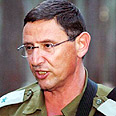
Northern Command chief: Ground forces entered late
Major-General Udi Adam tells Ynet ‘ground forces should have entered earlier and should have been called up earlier; I don’t know if this would decrease our fatality rate, because such operations have a price, but in my opinion the war would not have lasted as long’
“Where did we go wrong? In our understanding we needed to conduct an extensive ground operation, and as a result there were delays in preparing the forces. I don’t know if the ground offensive began too late – but it was late,” he said.
“The ground forces should have entered earlier and should have been called up earlier. The forces should have been better prepared – in this respect we were mistaken. I don’t know if this would decrease our fatality rate, because such operations have a price, but in my opinion the war would not have lasted as long.”
Who didn’t make the decisions? The political echelon?
Mainly the political echelon. The government officials are those who decide.
So they made things difficult for you?
I’m not certain that they made thing difficult for us. I can also understand them, but they did not reach decisions fast enough.
According to Adam, the discussion dealing with the decision to launch a wide-scale ground operation on Friday and then halt it on Monday morning due to the ceasefire agreement would have been prevented had the ground forces entered Lebanon at an earlier stage.
“The wise thing to do would have been to begin the operation earlier, just as we had planned,” he said.
As to reserve soldiers’ claims of disorder and logistical blunders, Adam said some of them are justified.
The major-general said the number of IDF casualties was relatively low for a month-long war, but added that “you can never know how many soldiers will be hurt; we did not know how the war would develop.”
'I assume they will not return'
The IDF is currently operating in self-defense mode only ahead of the expected arrival of the UNIFIL and Lebanese forces to the south within the framework of the ceasefire agreement. On Tuesday soldiers in Lebanon killed five armed terrorists.
The UNIFIL soldiers are expected to begin replacing the IDF forces within the next day or two, after which the Lebanese army forces will begin to head south as well.
Meanwhile it was cleared for publication late Tuesday that a commander at Hizbullah's special force, Sajed Dweir, was killed by IDF soldiers just hours before the ceasefire went into effect.
The IDF said that Dweir was behind many attacks against army troops, including plans to kidnap soldiers.
Adam said he hopes the ceasefire agreement will bring peace to Israel’s northern border.
“In the future we may witness a scenario in which Hizbullah infiltrates the Lebanese army; if this becomes a threat, we will point the finger at the Lebanese government and not act against the organization itself,” he said.”
“The arrival of the international force will simplify matters, but in any case we will not allow anyone approach the security fence (along the border). We destroyed many Hizbullah outposts; I assume they will not return.”
Turning his attention to Syria, the Northern Command chief said, “even if they repeatedly praise Hizbullah, they are well-aware of our capabilities against them, and therefore I believe they have no intention of starting a confrontation.”
Just one day before everything started, a General Staff forum in which both Prime Minister Ehud Olmert and Defense Minister Amir Peretz participated was held. Major General Adam painted a picture of the situation on the eve of war, "I said there that we must do something about the situation Hizbullah has gotten to, to talk to someone or to blow hot air."
At every stage of the fighting, he was in the Northern Command headquarters. From his perspective, it isn't over till its over. Currently, after Deputy Chief of Staff Major General Moshe Kaplinsky, acting as chief of staff representative in the command, finished his mission and returned to the Kirya military base in Tel Aviv, Adam is managing the IDF forces in southern Lebanon awaiting the entrance of the multinational force. "I think that we will all be happy if this process will bring quiet for a decade or so," he said to Ynet. "I don't know about the generals – but the soldiers fighting on the ground for sure won."
Reserved as he is, Adam didn't mean to be the scapegoat for this war. The bomb dropped by Chief of Staff Dan Halutz at the height of the fighting by sending his deputy, Major General Kaplinsky to the north, Adam won't forget so quickly. "I wouldn't define my feeling as insulted," said Major General Adam. "I think that an action was taken that didn't need to be taken during war. I think that what was important at that moment and also now, is the soldiers, and that is what I'm dealing with. After my authority and freedom to act weren't hurt, I swallowed it. After the war, we'll think beyond this."
According to him, the deputy chief of staff didn't harm his work and only gave advice when he saw fit. Do you think that sending the deputy chief of staff was a hint? Would that have happened had a different general been here? "I don't know. You have to ask the chief of staff."
By the way, what do you think about Halutz's stock scandal?
"I don't have anything to say on the issue. That is the chief of staff's private business and I don't deal with that."










